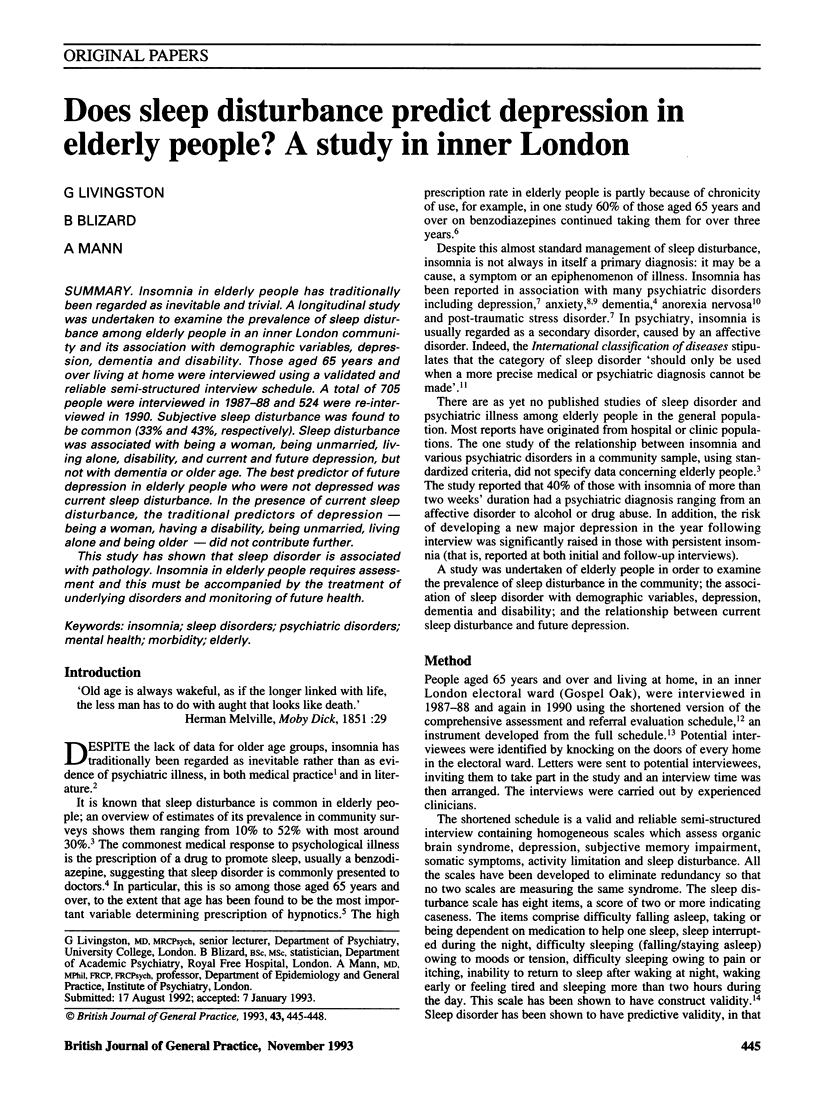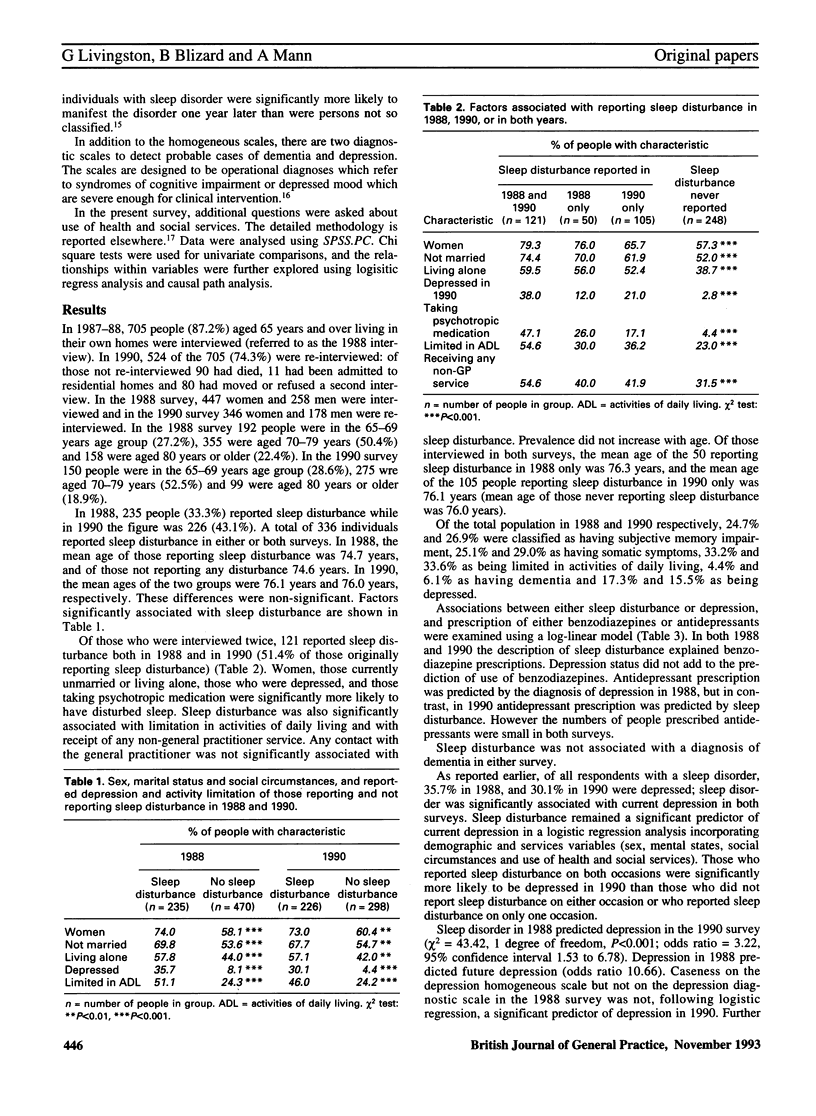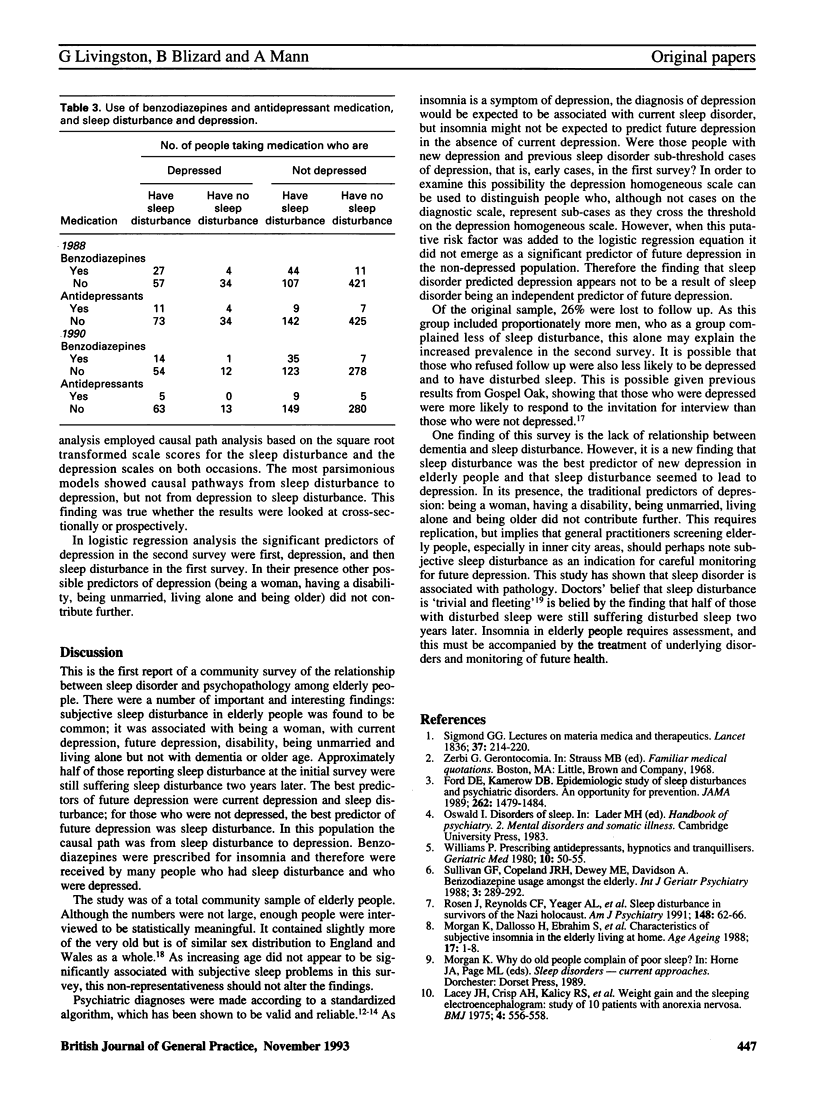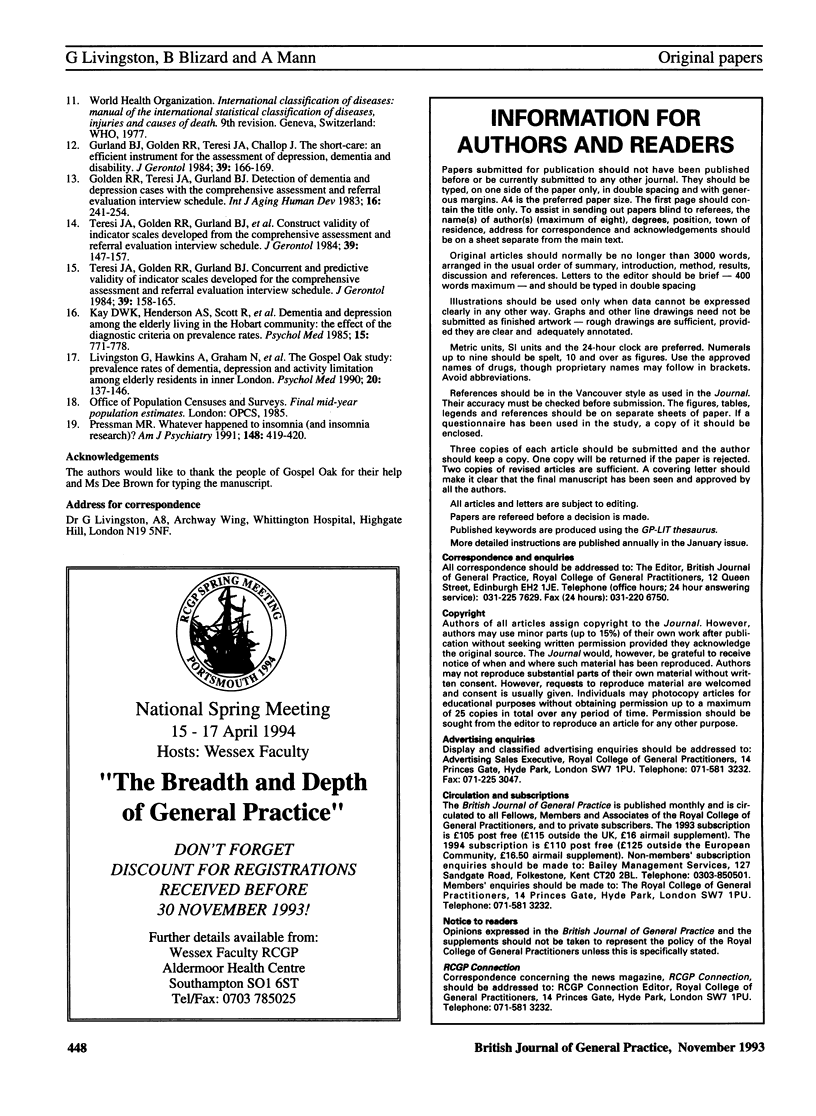Abstract
Insomnia in elderly people has traditionally been regarded as inevitable and trivial. A longitudinal study was undertaken to examine the prevalence of sleep disturbance among elderly people in an inner London community and its association with demographic variables, depression, dementia and disability. Those aged 65 years and over living at home were interviewed using a validated and reliable semi-structured interview schedule. A total of 705 people were interviewed in 1987-88 and 524 were re-interviewed in 1990. Subjective sleep disturbance was found to be common (33% and 43%, respectively). Sleep disturbance was associated with being a woman, being unmarried, living alone, disability, and current and future depression, but not with dementia or older age. The best predictor of future depression in elderly people who were not depressed was current sleep disturbance. In the presence of current sleep disturbance, the traditional predictors of depression--being a woman, having a disability, being unmarried, living alone and being older--did not contribute further. This study has shown that sleep disorder is associated with pathology. Insomnia in elderly people requires assessment and this must be accompanied by the treatment of underlying disorders and monitoring of future health.
Full text
PDF



Selected References
These references are in PubMed. This may not be the complete list of references from this article.
- Ford D. E., Kamerow D. B. Epidemiologic study of sleep disturbances and psychiatric disorders. An opportunity for prevention? JAMA. 1989 Sep 15;262(11):1479–1484. doi: 10.1001/jama.262.11.1479. [DOI] [PubMed] [Google Scholar]
- Golden R. R., Teresi J. A., Gurland B. J. Detection of dementia and depression cases with the Comprehensive Assessment and Referral Evaluation interview schedule. Int J Aging Hum Dev. 1982;16(4):241–254. doi: 10.2190/by6j-960y-ehn7-6lbc. [DOI] [PubMed] [Google Scholar]
- Gurland B., Golden R. R., Teresi J. A., Challop J. The SHORT-CARE: an efficient instrument for the assessment of depression, dementia and disability. J Gerontol. 1984 Mar;39(2):166–169. doi: 10.1093/geronj/39.2.166. [DOI] [PubMed] [Google Scholar]
- Kay D. W., Henderson A. S., Scott R., Wilson J., Rickwood D., Grayson D. A. Dementia and depression among the elderly living in the Hobart community: the effect of the diagnostic criteria on the prevalence rates. Psychol Med. 1985 Nov;15(4):771–788. doi: 10.1017/s0033291700005006. [DOI] [PubMed] [Google Scholar]
- Lacey J. H., Crisp A. H., Kalucy R. S., Hartmann M. K., Chien C. N. Weight gain and the sleeping electroencephalogram: study of 10 patients with anorexia nervosa. Br Med J. 1975 Dec 6;4(5996):556–558. doi: 10.1136/bmj.4.5996.556. [DOI] [PMC free article] [PubMed] [Google Scholar]
- Livingston G., Hawkins A., Graham N., Blizard B., Mann A. The Gospel Oak Study: prevalence rates of dementia, depression and activity limitation among elderly residents in inner London. Psychol Med. 1990 Feb;20(1):137–146. doi: 10.1017/s0033291700013313. [DOI] [PubMed] [Google Scholar]
- Morgan K., Dallosso H., Ebrahim S., Arie T., Fentem P. H. Characteristics of subjective insomnia in the elderly living at home. Age Ageing. 1988 Jan;17(1):1–7. doi: 10.1093/ageing/17.1.1. [DOI] [PubMed] [Google Scholar]
- Pressman M. R. Whatever happened to insomnia (and insomnia research)? Am J Psychiatry. 1991 Apr;148(4):419–420. doi: 10.1176/ajp.148.4.419. [DOI] [PubMed] [Google Scholar]
- Rosen J., Reynolds C. F., 3rd, Yeager A. L., Houck P. R., Hurwitz L. F. Sleep disturbances in survivors of the Nazi Holocaust. Am J Psychiatry. 1991 Jan;148(1):62–66. doi: 10.1176/ajp.148.1.62. [DOI] [PubMed] [Google Scholar]
- Teresi J. A., Golden R. R., Gurland B. J. Concurrent and predictive validity of indicator scales developed for the Comprehensive Assessment and Referral Evaluation interview schedule. J Gerontol. 1984 Mar;39(2):158–165. doi: 10.1093/geronj/39.2.158. [DOI] [PubMed] [Google Scholar]
- Teresi J. A., Golden R. R., Gurland B. J., Wilder D. E., Bennett R. G. Construct validity of indicator-scales developed from the Comprehensive Assessment and Referral Evaluation interview schedule. J Gerontol. 1984 Mar;39(2):147–157. doi: 10.1093/geronj/39.2.147. [DOI] [PubMed] [Google Scholar]


